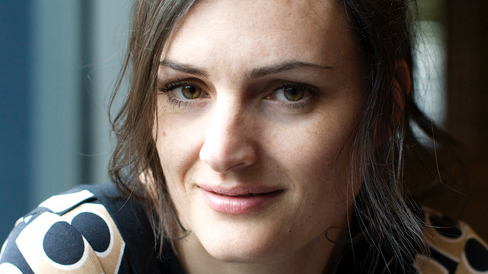Locarno: Bettina Oberli: A Crowdpleaser Strikes Out as an Auteur
By John Hopewell
LOS ANGELES (Variety.com) – LOCARNO, Switzerland — There’s a moment near the beginning of Bettina Oberli’s latest film, “With the Wind,” where Pauline seems to have her world all sorted out.
She flies into a tis when her vet sister suggests she should inspect the cows on their family farm in the remote Jura mountains, which Pauline has spent 15 years with partner Alex turning into a near self-sustainable unit. She takes in a student, Galina, from Chernobil, thinking a month on the farm will be healthy for her, laughs at Galina’s flailing attempts to get a signal for her cell phone, holding it high to the heavens up on the nearest hill.
Then Samuel, a world-shuttling engineer, arrives to erect a wind turbine and makes Pauline ask herself whether she has made a life choice without knowing well enough other options.
By the time of her fifth feature, Oberli could also be thought to have her home Swiss film industry sussed out. Her second feature, 2006’s ““Late Bloomers,” proved one of Switzerland’s biggest domestic smash hits ever; “Lovely Louise,” another dramedy, was well-received on the festival circuit.
Produced by top Swiss production house Rita Productions and France’s Silex Films, and co-produced by Belgium’s Versus Production, “With the Wind,” however, explores other options. It’s Oberli’s first film in French, marking not only a change of geographical scenery, but a move from crowd pleasing dramedies to a more obviously auteurist mode.
“I felt I had to move a bit out of my comfort zone, jump into water, be brave, to dare,” Oberli comments, admitting to be “really quite Francophile,” to admire French culture, cinema, such as the films of Oliver Assayas.
Also, she wanted to make a film in the Swiss Jura mountains, looping north of the western Alps. “It’s not a typical part, it’s so vast. earth, forests, the sky, nothing else.”
Moving into French, Oberli has been able to tap another world of talent, both cast – Melanie Thierry (“Princess of Montpensier”), and co-writer Antoine Jaccoud, Ursula Meir’s longterm co-writer, who suggested giving the film a contemporary ecological edge. Maybe France’s most admired young woman director, Celine Sciamma (“smart, sophisticated, funny,” says Oberli) boarded as a script collaborator.
In “With the Wind,” Pauline has an affair with Samuel. But the film is not really about a woman having to choose between two attractive, dominant men, telenovela style. Rather, driving deeper into the theme of emotional growth, it portrays how Pauline begins to realize she is subservient to Alex’s dream, sets out to determine and control what she really want in life.
That theme, and rural settings, runs through much of Oberli’s feature work. In her 2004 debut, “Im Nordwind,” then “Late Bloomers” and “Lovely Louise,” now “With the Wind,” characters living a settled life see their existence suddenly turned upside down by a surprise event, encouraging them to follow their heart.
“Maybe it has something to do with my origins,” Oberli ventures. “I come from a country where everything is settled, ordered. I don’t come from war, battlefields, we are not a crisis region.”
She was born in Interlaken in the Bernese Alps, central Switzerland, famed for its lake and the north walls of the Eiger and Jungfrau, plunging 7,000 feet, near sheer, to the green pastures, placid cows and farmsteads below.
Moving to Samoa, in the South Pacific, she came back to Interlaken for her school days. When she started school she always had a feeling that many other students had a “pool of experience, very exciting lives, double-nationalities, came from very difficult countries, like ex-Yugoslavia,” she says.
“Mine in comparison was boring.” But she has drawn on her rural upbringing throughout her films. In “With the Wind,” I wanted everything to be in movement, the wind, all the time, and the characters as well. I told the actors: ’Don’t stand still and say your lines, move. As a farmer, especially a farmer with a political ideology, you have the sensation that you should always be doing something.’ That worked quite well, she recognizes: “The actors had something to work on.”
Oberli herself seemingly sees little rest. She has tried her hand at genre – horror film The Murder Farm” – and diversified into TV, with a mini-series, “Private Banking,” aired last year. She is now preparing a film in German with Zodiak Pictures, a family story co-written with Andre Dresen sometime co-scribe, Cooky Ziesche. Then she has two series, with the same team of limited mini-series “Private Banking.” One is about the international art market, the other one about Switzerland in the ‘80s – “punk and drugs,” Oberli says.
“Then I want to make another French film,” she adds. In” With the World,” Pauline looks out over huge limestone cliffs, sense ing that the world is a far larger place than her enclosed rural origins. Oberli would no doubt agree.

